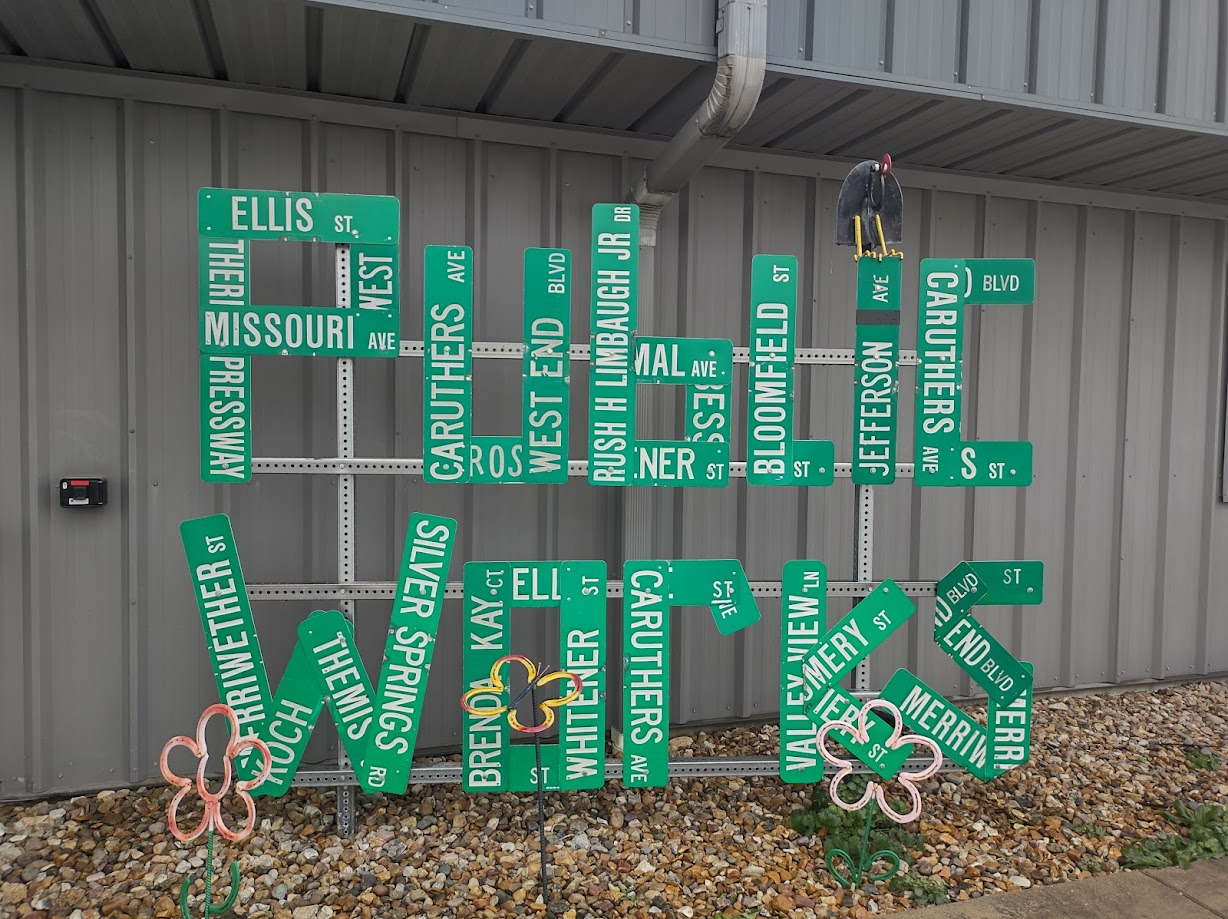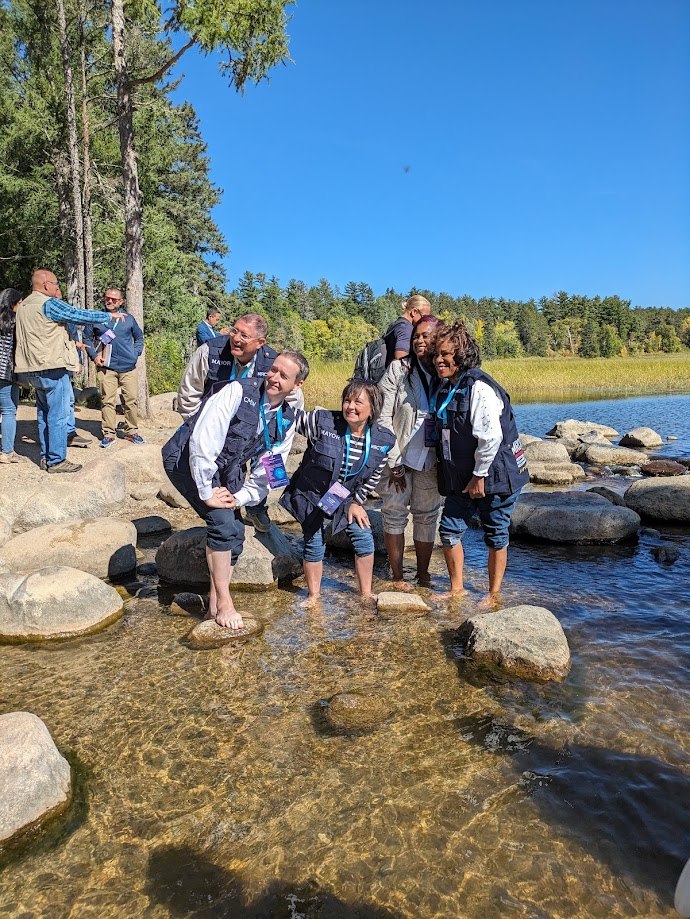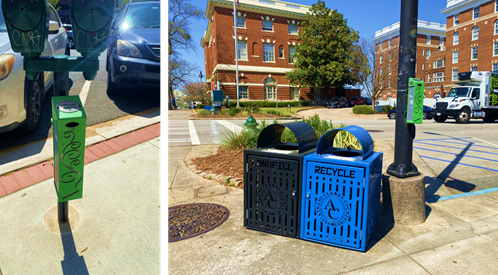Local Leaders Advance Circularity
The Circularity Informatics Lab (CIL) conducted the Circularity Assessment Protocol (CAP) in each of six cities with varying population in order to engage communities in this project: Athens, GA; Blytheville, AR; Vicksburg, MS; Atlanta, GA; Minneapolis, MN; and Cape Girardeau, MO. During each CAP, the city and the local community were engaged through public outreach to the mayor’s office and/or office of solid waste or public works offices.

One challenge for communities in this project is that all these cities, no matter their size, do not have enough resources to put forward as much time or effort as they want to on circularity or waste management. Minneapolis had the most comprehensive circularity, and spent time mentoring Athens through a compost pilot, but typically other community needs (e.g., roads/sidewalks/infrastructure, water, wastewater, safety, etc.) need to be prioritized over thinking or working on waste circularity. This is starkly evident in the smaller cities where solid waste programs are often limited to primarily collection and disposal. However, the cities of Atlanta, Blytheville, and Athens remain engaged in actively working on waste circularity with UGA or other project partners. The city of Minneapolis remains a leader in waste circularity. Further engagement with the cities of Vicksburg and Cape Girardeau are taking place with CAP data led by MRCTI.
At least two of the mayors from cities that hosted CAPs have shown leadership on circularity through MRCTI. Mayor Logan from Blytheville, AR has become a leader in communicating about circularity, plastic pollution and her city’s perspective. Mayor Logan traveled and presented her city’s perspective (informed by the CAP), at the The WWF Plastics Policy Summit in March of 2023 and The Cities of American meeting in April of 2023.
In addition, Cape Girardeau‘s mayor, Mayor Kinder, presented at the Mississippi River City and Towns Initiative (MRCTI) Lobby Day Reception in Washington, DC, March 7, 2024. She presented on extended producer responsibility (EPR) which is one of the opportunities outlined in the CAP report for Cape Girardeau. Last, the MRCTI mayors (104 mayors) show an expanded level of awareness by releasing a Mississippi River Mayors Plastic Free Pledge, which includes:
Cities Will Lead in Implementing a Strategy to Stop Plastic
Because the epicenter of the plastic pollution crisis is cities, we are at the front lines of this crisis and are tasked with addressing the consequences of plastic pollution and implementing the solutions needed to solve this problem.
Importantly, many of the solutions and approaches under consideration being discussed internationally are already being implemented in cities across the world at varying scales. Cities are determined to continue this work with or without international or national action.
Regional collaboration, source reduction of single-use plastics, prevention of plastic litter, expanded circularity prioritizing for local benefit, spurring of post-consumer waste materials trade, and implementing of consistent reporting and tracking are just some of the transformative actions being taken by our cities.
Cities’ Priority List for a Solution to Plastic Waste Reduction
The Mayors signed onto this pledge do hereby agree to work as a coalition with the private sector to do the following:
- Identification of chemicals and polymers of concern as well as problematic and avoidable plastic products;
- Policies and programs for scalable reduce, reuse, refill, and repair/Circularity approaches for plastic products;
- Implementation of consistent regulatory measures that will improve the economics and quality of mechanical recycling of plastics;
- Extended Producer Responsibility (EPR) policy that works with the private sector and includes reduction, reuse, and recycling;
- Solid Waste management system improvements inclusive of existing local small business providers for local economic benefit, and that include required consistent tracking and reporting of collected recoverable materials to their final destination;
- Local economic transition resources to replace legacy petro-based manufacturing with clean alternatives;
- The establishment of incentives to expand a post-consumer waste materials economy.
Decisive Action
As Mayors along the world’s mightiest river, we cannot and will not abdicate this incredible challenge of our time to nation-states alone – the responsibility of cities to be part of the solution is beyond reproach.

The CAP results and other Mississippi River plastic pollution data and community actions were discussed at the MRCTI Annual Meeting in September 2023. There were approximately 50 people (including over 20 mayors in attendance). Discussions were focused around upstream changes, EPR, solid waste and recycling infrastructure. The company Replenysh, that aggregates and recycles materials for a portion of the profits for communities, presented their business case. In August 2024, a workshop was held with the Plastic Waste Reduction Campaign Manager from MRCTI. There, the six-city combined CAP results were discussed along with interventions.

In Athens, Taylor Maddalene, of the CIL, was appointed to the Athens Clarke County Solid Waste Commission in October 2022 (through a vetting and application process). In this capacity she helps inform decisions and participates in discussions for Athens-Clarke County (ACC). In Nov. 2023, Taylor presented CAP data along with other litter data collected by community members, Keep ACC Beautiful and Rivers Alive with UGA’s app Debris Tracker. The CAP data mostly included the store and restaurant data, along with the leakage (litter) data. The mayor has asked for this information and data to begin policy change focused on a plastic bag and expanded polystyrene (EPS) ban in ACC. There is now a draft ordinance that is recommended by the commission which would eliminate plastic bags and EPS containers at points of purchase in ACC, under a phased approach (not passed yet though, still only in draft form).

In this Walmart.org project of six cities, CAP data informed the intervention strategies taken by these cities. While some cities are still limited by time and resources currently, they now have the CAP data to reference for grant applications, other future potential work, or interventions.